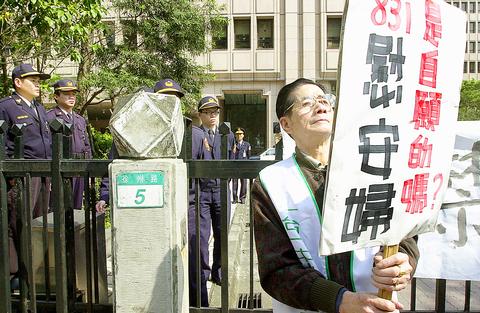Premier Chang Chun-hsiung (
Responding to legislator questioning at a routine interpellation session, Chang said that although Japanese cartoonist Yoshinori Kobayashi's (小林善) controversial comic book On Taiwan (
In the comic book, Kobayashi quoted senior presidential policy adviser Shi Wen-lung (

PHOTO: CHEN CHENG-CHANG, TAIPEI TIMES
Kobayashi also claimed that some of Taiwan's indigenous people willingly joined the Japanese army.
The ban, which the ministry earlier said it would re-evaluate, drew strong criticisms from one of President Chen Shui-bian's (
King was banned from entering Taiwan for three decades during the era of martial law, which did not come to an end until 1987.
Meanwhile, at another legislative session earlier in the day, opposition legislators demanded the dismissal of the two presidential advisers.
KMT lawmaker, Chen Ching-pao (
Lawmaker's were particularly incensed after King -- a longstanding supporter of Taiwan's independence -- said on a television talk show that she does not recognize the Republic of China.
Daring President Chen to step into the fray, Chen said the president should step forward to "say something" instead of "hiding in the Presidential Office" while his advisers "shame the whole nation."
Pro-China People First Party lawmaker Chin Huei-chu (秦慧珠) said that if King continues to say she is not an ROC citizen and does not recognize the Republic of China, then the president and the premier should not simply sit by while she "tramples all over the Republic of China," but should instead dismiss her from her post.
Meanwhile, a 30-member delegation of the radical Taiwan Independence Party staged a peaceful protest in front of the Ministry of the Interior to denounce its decision to ban Kobayashi from entry into Taiwan.
They said that Chinese President Jiang Zemin (

Intelligence agents have recorded 510,000 instances of “controversial information” being spread online by the Chinese Communist Party (CCP) so far this year, the National Security Bureau (NSB) said in a report yesterday, as it warned of artificial intelligence (AI) being employed to generate destabilizing misinformation. The bureau submitted a written report to the Legislative Yuan in preparation for National Security Bureau Director-General Tsai Ming-yen’s (蔡明彥) appearance before the Foreign Affairs and National Defense Committee today. The CCP has been using cognitive warfare to divide Taiwanese society by commenting on controversial issues such as Taiwan Semiconductor Manufacturing Co’s (TSMC, 台積電) investments in the

INVESTIGATION: The case is the latest instance of a DPP figure being implicated in an espionage network accused of allegedly leaking information to Chinese intelligence Democratic Progressive Party (DPP) member Ho Jen-chieh (何仁傑) was detained and held incommunicado yesterday on suspicion of spying for China during his tenure as assistant to then-minister of foreign affairs Joseph Wu (吳釗燮). The Taipei District Prosecutors’ Office said Ho was implicated during its investigation into alleged spying activities by former Presidential Office consultant Wu Shang-yu (吳尚雨). Prosecutors said there is reason to believe Ho breached the National Security Act (國家安全法) by leaking classified Ministry of Foreign Affairs information to Chinese intelligence. Following interrogation, prosecutors petitioned the Taipei District Court to detain Ho, citing concerns over potential collusion or tampering of evidence. The

‘COMPREHENSIVE PLAN’: Lin Chia-lung said that the government was ready to talk about a variety of issues, including investment in and purchases from the US The National Stabilization Fund (NSF) yesterday announced that it would step in to staunch stock market losses for the ninth time in the nation’s history. An NSF board meeting, originally scheduled for Monday next week, was moved to yesterday after stocks plummeted in the wake of US President Donald Trump’s announcement of 32 percent tariffs on Taiwan on Wednesday last week. Board members voted to support the stock market with the NT$500 billion (US$15.15 billion) fund, with injections of funds to begin as soon as today. The NSF in 2000 injected NT$120 billion to stabilize stocks, the most ever. The lowest amount it

NEGOTIATIONS: Taiwan has good relations with Washington and the outlook for the negotiations looks promising, Minister of Economic Affairs J.W. Kuo said Taiwan’s GDP growth this year is expected to decrease by 0.43 to 1.61 percentage points due to the effects of US tariffs, National Development Council (NDC) Minister Paul Liu (劉鏡清) said at a meeting of the legislature’s Economics Committee in Taipei yesterday, citing a preliminary estimate by a private research institution. Taiwan’s economy would be significantly affected by the 32 percent “reciprocal” tariffs slapped by the US, which took effect yesterday, Liu said, adding that GDP growth could fall below 3 percent and potentially even dip below 2 percent to 1.53 percent this year. The council has commissioned another institution